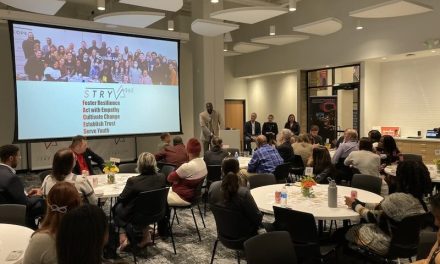
Greater Milwaukee Foundation grants $1.25M to Children’s to tackle childhood asthma
Research partnership will study effectiveness of reducing environmental triggers of asthma
Milwaukee – The Greater Milwaukee Foundation has awarded a $1.25 million grant to Children’s Hospital of Wisconsin aimed at reducing the health risks and economic burden of asthma on children in greater Milwaukee.
The Foundation’s funding is launching a five-year research project focused on identifying and reducing irritants in the home that trigger asthma symptoms. This work has the potential to improve health and decrease medical costs for people affected by asthma, especially children of color living in urban Milwaukee.
“Research shows that asthma disproportionately affects communities of color with devastating impact. African Americans have the highest prevalence of asthma, are hospitalized at five times the rate of white patients and are four times more likely to die of asthma. We have the opportunity through this community research project to focus resources where they are needed most,” said Ellen Gilligan, president and CEO of the Greater Milwaukee Foundation. “Children’s Hospital of Wisconsin brings unique capabilities and expertise in community research to this project that will benefit children in Milwaukee, in our region and throughout Wisconsin. The Greater Milwaukee Foundation is pleased to support and partner with CHW on this important effort.”
Throughout the state, 12 percent of adults and 11 percent of children have been diagnosed with asthma. Reduced health care utilization would provide financial savings to the region as a whole. On average, each hospitalization costs $13,300, meaning the annual costs related to asthma admissions in Wisconsin exceed $63 million.
Home irritants are known to be higher in urban environments, with new data suggesting urban pesticide exposure may be a significant contributor. Expanding on previous work, Children’s Hospital allergists will lead this new research by conducting outreach and education about irritant triggers directly in the homes of asthmatic children living in urban Milwaukee.
“At Children’s we are as committed to keeping kids healthy as we are to treating them when they are sick,” said Peggy Troy, president and CEO of Children’s Hospital of Wisconsin. “The results of this study will be so important. By sharing what we learn with other health systems and providers, we can get closer to our vision that Wisconsin kids can be the healthiest kids in the nation.”
The research and community health team will assess participants’ level of exposure to asthma irritants in the home, as well as recommend how families can eliminate or lessen the exposures.
The research will incorporate a preliminary genetic study that will examine associations between a participant’s genes, the irritants that trigger their asthma and their response to environmental interventions. Data about these genetic differences could inform expanded research in the future.
“We know that true change happens through great partnerships. I’m proud to collaborate with the Greater Milwaukee Foundation to help address this particular health disparity,” said Troy. “If we can keep families out of the emergency room for asthma related issues, we can also reduce the amount of missed work and school, and improve the quality of their lives.”
Over five years, this project will not only directly improve the lives of participating children living with this chronic disease, it will help determine the effectiveness of the program for impacting asthma control. Long term results could involve stakeholders – including insurance payers and health care systems – using the information to implement or expand similar programs in their communities.
The grant is being funded through the Foundation’s Russell J. and Betty Jane Shaw Fund, which supports medical research for childhood diseases. The Shaws were Wisconsin natives who lived their married lives in Whitefish Bay and Glendale. A graduate of the University of Wisconsin-Madison, Russell was an area businessman. Betty, a Downer College graduate, gave generously of her time as a community volunteer. The research is being led by Mitchell Grayson, MD, a pediatric asthma and allergy specialist at Children’s and associate professor of pediatrics at Medical College of Wisconsin.





